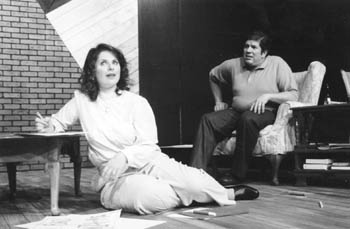![[Metroactive Stage]](/stage/gifs/stage468.gif)
[ Stage Index | Silicon Valley | Metroactive Home | Archives ]
Comedy of Errors
Two wrongs make a right--sort of--in 'The House of Correction'
By Heather Zimmerman
IF THERE ARE none so blind as those who will not see, with The House of Correction, playwright Norman Lock introduces us to some people who have the world's biggest blinders on. City Lights Theater Company presents a brutally cheerful production of this black comedy about the pitfalls of believing we lead an insular existence.
The play is strongly reminiscent of Max Frisch's brilliant satire The Firebugs, in which a wealthy and vain businessman, desperate to think himself open-minded and generous, allows two arsonists to move in with him and eventually to burn his house down. In this case, the "firebug" is Steve (Tom Gough), an unhinged but clever man who insinuates himself into the household of Carl (Derek McCaw) and Marion (Shannon Warrick), a yuppie couple smugly entrenched in their comfortable suburban lifestyle.
Steve has an agenda: systematic revenge on a group of people he deems responsible for his wife's death. Carl, it turns out, is the last on his list, and Steve sets about building the instrument of his vengeance in Carl's own basement. Steve makes himself right at home and quickly moves into bed with Marion. McCaw's subtly comic portrayal of Carl as full of self-important bluster--though nothing but cowardly and petulant when thwarted--ensures that although he is technically the victim, we don't much care. As an excellent foil for Carl, Warrick's unfailingly chipper Marion plays like June Cleaver with an edge. Warrick addresses everyone and every situation with the same hilarious saccharine tone, as if all the world were kindergartners.
There's no mistaking that these folks are stubbornly, arrogantly ignorant of the world outside of their home, which may be their undoing. Steve, not surprisingly, almost seems the sanest of the bunch, if simply because he's cognizant that his actions can affect others. And Gough plays him calmly, rationally, but with an ominous glint in his eyes only the audience sees.
Director Lisa Mallette keeps the energy always up and the tone light--deliberately like a sitcom--however dark the events become. The effect works perfectly, conveying a detachment, almost a callousness, toward suffering--an apt reflection of Carl and Marion. The play does lag at the beginning of the second act, when Steve shares his philosophies of life with Marion. The scene lacks the snap of the rest of the play, but more importantly, the method behind this madman hardly seems relevant. In fact, it feels counterintuitive to delve too deeply into anyone's psyche in this play because the characters are purposefully one-dimensional; in a sense, they are more devices than people.
Nonetheless, with these starkly symbolic characters, Lock gets across a meaningful message about a basic aspect of being human: that no one lives a life free of responsibility to others. Of course, when Marion and Carl finally seize upon this idea, they embrace it in a way that suggests some people are simply incorrigible.
[ Silicon Valley | Metroactive Home | Archives ]
Copyright © Metro Publishing Inc. Metroactive is affiliated with the Boulevards Network.
For more information about the San Jose/Silicon Valley area, visit sanjose.com.
![]()

Prisoners of Suburbia: Shannon Warrick and Derek McCaw play a married couple made prisoners in their own home.
The House of Correction plays Thursday-Saturday at 8pm and Sunday at 7pm through April 20 at City Lights Theater, 529 S. Second St., San Jose. Tickets are $15-$22. (408.295.4200)
Send a letter to the editor about this story
.
From the April 4-10, 2002 issue of Metro, Silicon Valley's Weekly Newspaper.